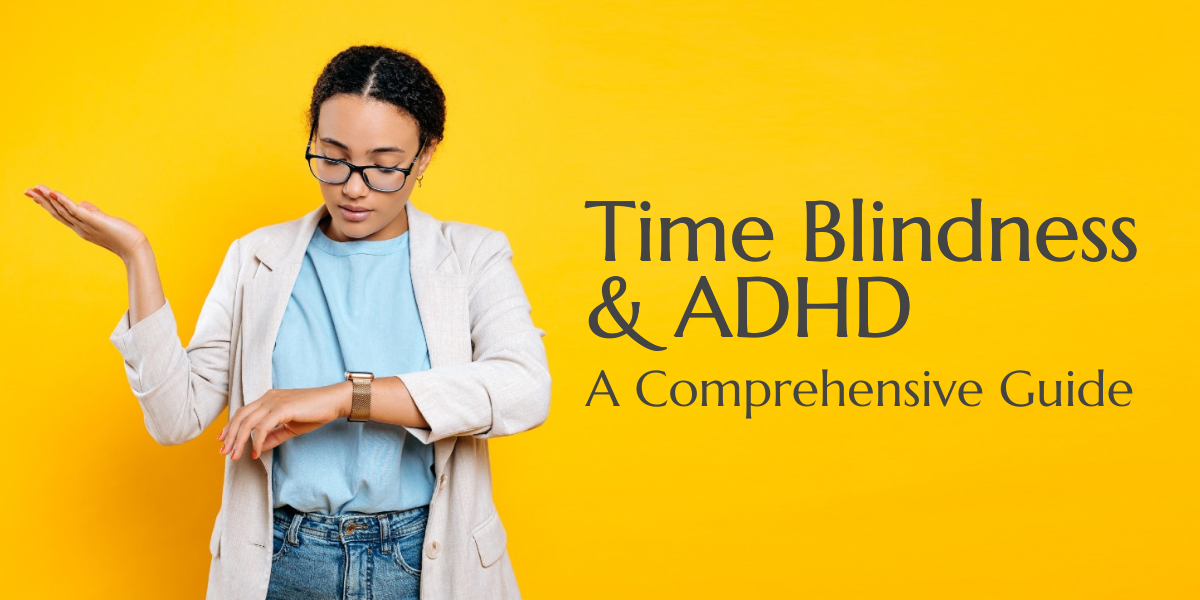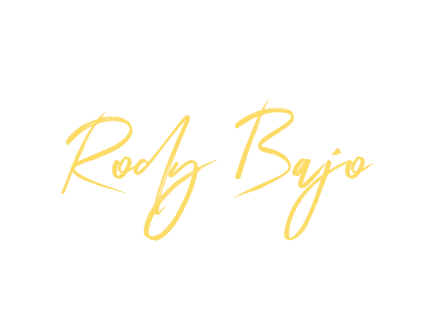What is Time Blindness?
Do you often find yourself struggling to manage your schedule, running late, and feeling overwhelmed by the constant race against the clock?
Or more commonly (especially for professionals), do you find yourself living out of your calendar?
If so, you may be experiencing a phenomenon known as time blindness – a common challenge among people with ADHD.
Time blindness is a lack of the internal perception of the passage of time.
Read that again!
Lack of the internal perception.
Of the passage of time!
While anyone could lose track of time every now and then, people with ADHD experience this constantly and consistently, in multiple areas of life.
It’s also interesting that time blindness is a trait that many adults may not relate to pre-diagnosis, especially if they’ve developed effective coping strategies like using calendars and alarms, until they really understand the internal experience (the feeling) of having time blindness.
Examples of Time Blindness in Adults with ADHD
While not everyone who experiences time blindness has ADHD, it’s a strong indicator as time blindness is a universal trait for people with ADHD.
Here are some examples of what it can look like in our day-to-day lives:
- over-estimating or under-estimating how much time has passed,
- over-estimating how long difficult or stressful tasks will take (submitting forms, doing reports, working on taxes or BAS),
- under-estimating how long simple tasks will take (“it will only take 10 minutes“, and well… it doesn’t!)
Here are some examples of what it can look like in our day-to-day lives:
- losing track of time completely losing yourself in a project,
- constantly (and anxiously) looking at and living out of your calendar,
- going into “waiting mode” when you have a few hours of free time before your next meeting,
- being either always early or always late to important appointments or meetings,
- feeling like no time has passed when meeting a friend you haven’t seen for years,
- you met a friend a few weeks ago, when in fact it’s been months,
- asking “how is it already 2pm?” or “how is it already April?”
- miscalculating how long certain tasks can take (“it will only take 10 minutes”, and, well, it doesn’t!)
- feeling like large, stressful tasks (submitting forms, doing reports), will take hours, only to find it was faster than you thought.
Relatable?
Time blindness is a symptom of ADHD characterised by difficulty with managing and understanding time. You may find it difficult to set appropriate goals, stick to a timeline and stay on track with tasks.
It could be a challenge to organise your day and your time – as to how much time you have, how to use it and track it. Due to difficulty with time blindness, you may often find yourself rushing, procrastinating, or being late to appointments. This can lead to feelings of overwhelm, which can be disabling.
Modes of Time Perception
As a general rule, people with ADHD have two modes of time:
Now, and not now!
If a deadline is 2 weeks away, it’s “not now”, and hence not urgent. In reality, there may be other priorities and commitments that mean you only have a few hours to work on the task before the deadline, but it’s not seen as a priority because it’s “not now”.
To fully grasp time blindness, it’s essential to understand the different modes of time perception:
Clock Time
- What is it? This is the conventional understanding of time, marked by hours, minutes, and seconds.
- For ADHDers: Individuals with time blindness don’t generally have a linear concept of time, and therefore struggle to conceptualise time in days, hours, minutes, etc.
Event Time
- What is it? Event time focuses on the sequencing of events and how time is perceived in relation to personal experiences.
- For ADHDers: While people with ADHD tend to track time in Event Time mode (ie. I need to pick up a parcel after my dentist appointment on Tuesday morning), they may find it challenging to maintain a consistent sense of time, causing them to struggle with punctuality and time management.
Task Time
- What is it? Task time refers to the ability to estimate the duration required for completing specific tasks.
- For ADHDers: Those with time blindness often underestimate or overestimate the time needed to complete, leading to missed deadlines and increased stress. They usually estimate task time using emotions. If something feels easy, it’ll only take 30 minutes. If something feels challenging, it will take all week.
Internal Time
- What is it? Internal time is an individual’s personal sense of time, which may differ from the external clock time.
- For ADHDers: Individuals with ADHD may have a distorted internal clock, leading to difficulties in planning and prioritising activities. Research has shown they tend to have a faster internal clock.
The Pros and Cons of Time Blindness
The stigma of ADHD is alive and kicking, refusing to die even as we make advancements in neuroscience and learn more about how the brain works.
Traditionally, people with ADHD have been viewed as broken and lacking in a society that values consistency and timeliness (eg in Western culture. Read below about Island Time). It’s easy to do when we judge people by how their behaviours conform to societal norms.
As an advocate of looking at ADHD as a neurotype (it’s literally how our brains are wired), rather than a deficit (there’s something wrong, and it’s not normal), I prefer to look at ADHD traits with an objective lens.
Pros
- People with time blindness often have a unique ability to focus intently (hyperfocus) on tasks they find interesting or engaging, sometimes leading to impressive levels of productivity.
- Time blindness can also make it easier for people with ADHD to live in the moment and be spontaneous, as they may not be as focused on schedules or routines.
- People with ADHD often have a strong sense of urgency, which can help them work quickly and efficiently when they’re motivated.
- Some individuals with ADHD may thrive in fast-paced or high-pressure environments where quick thinking is important.
- Time blindness can sometimes lead to creative problem-solving.
- When faced with unexpected changes or challenges, people with ADHD may be able to adapt quickly and find new solutions on the fly.
Cons
- Difficulty estimating how long tasks will take can lead to chronic lateness, missed deadlines, and other problems that can impact personal relationships, missed opportunities and professional success.
- Time blindness can cause stress and anxiety around planning or scheduling activities. This can contribute to feelings of overwhelm or burnout over time.
- Chronic “procrastination” can be a consequence of time blindness among people with ADHD, who have every intention of doing the thing, and hence be misjudged as having a moral failing, leading to embarrassment, lack of self-trust, and shame.
- While hyperfocus can be beneficial for productivity, it can disrupt schedules and cause frustration when important tasks are neglected.
It’s worth noting that these are generalisations; everyone experiences ADHD differently and there are many factors that influence an individual’s relationship with time.
Time Blindness and Cultural Influence
It’s important to note that the experience of time, and the value we place on it, is a cultural construct.
Western culture places a high value on timeliness and time management, while the majority of the world tends to have a less rigid relationship with time. Think of “island time” or “rubber time”.
While generally seen as a negative trait in Western culture, time blindness can have benefits too. Losing track of time and immersing yourself in a conversation with someone (family, friend, colleague, client), can foster strong, genuine relationships in relatively short amounts of time. Likewise, losing yourself in a project (hyperfocus), can provide the creativity and space to solve complex problems and achieve amazing results.
Effective Strategies To Manage Time Blindness
Understanding what time blindness is, is half the battle.
Now that you know what it is, you have a framework to anticipate time blindness, and plan accordingly!
Here are a few effective strategies to get you started managing time blindness, and improving your relationship with time.
Building Your Awareness of Time
As stated above in one of the cons (chronic “procrastination”), people with ADHD can experience challenges related to time blindness without even realising it.
Take the time to step back and reflect on how time blindness has impacted your day. You can learn mindfulness techniques that ground you in the present moment, enhancing your perception of time, or more importantly, enhancing your awareness when time slips by.
By practising mindfulness and self-awareness, you can overcome distractions and better manage your schedule.
Develop Skills for Time Mastery
- Use clocks, alarms, and timers:
- Don’t limit yourself to your phone’s alarms. Set them up on your computer too.
- Buy analogue alarms (yes, plural!) that force you to stand up and turn them off.
- Put a clock in every room of your house.
- Use egg timers.
- Use technology to manage routines:
- Most calendars have default reminders set to 30 minutes before an event started. You can change this setting and add more than one reminder.
- Create a calendar event for yourself for monthly life-admin. Add a list of tasks in that event to reduce procrastination and help you get started on autopilot.
- Use alarms and timers for routines (taking out the bins, bringing them in, etc). Change the number of snoozes depending on the alarm.
- Set Faster (not smaller) Goals:
- Break down larger goals into quick wins that you can get through faster.
- Get a friend or colleague to be a mutual accountability partner. This is called body doubling technique manageable tasks, allowing you to better estimate the time required for each activity.
- Time Blocking and Buffer Time:
- Allocate dedicated time slots for specific tasks, ensuring that you focus on one task at a time and avoid multitasking. Use digital calendars or planners to visually represent your schedule.
- As a rule of thumb, double the time you think it will take to complete a task.
- Add a buffer time between tasks, especially for transitions between modes. If you change from one type of task to another, or change from work mode to life-admin mode, add a buffer between tasks to give your brain time to rest and transition.
- Visual Aids and Reminders:
- Utilise visual cues, such as sticky notes, whiteboards, customised popup notifications, to prompt you to start or complete tasks on time. Visual aids can serve as powerful reminders of your commitments.
Working with an ADHD Coach
ADHD coaching plays a vital role in helping people develop self-awareness regarding their time-related challenges.
Through coaching, you can gain an understanding of:
- how your brain works,
- build a framework to recognise the barriers that stand in your way, and
- establish personalised strategies to effectively manage your time and create long-lasting change.
As someone who both has ADHD, and spends their days helping people with ADHD, time blindness is personal to me!
I love working through the barriers and helping my clients create realistic strategies that work with their brain, not against it.
Book your 30 min discovery call now or join my mailing list to stay in the loop when I have new workshops & opportunities.





